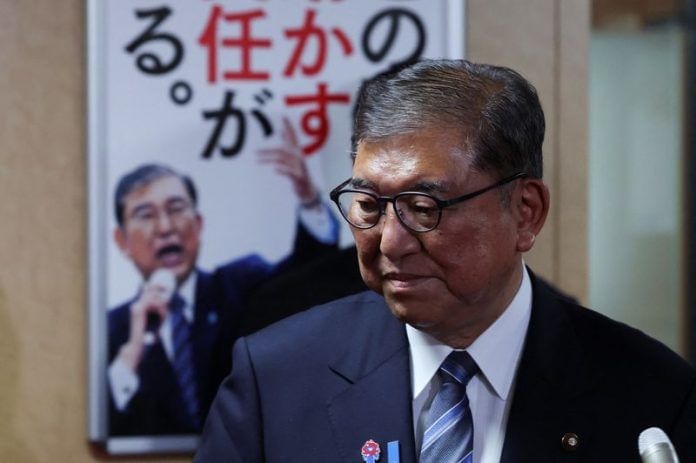By Yuka Obayashi and Nobuhiro Kubo
TOKYO (Reuters) -Embattled Japanese Prime Minister Shigeru Ishiba will resign to avoid a split within his ruling party, a source close to the premier said on Sunday, pitching the world’s fourth-largest economy into fresh political uncertainty.
A spokesperson for the Prime Minister’s Office did not immediately have a comment when contacted by Reuters, but the government said Ishiba would hold a press conference at 6 p.m. (0900 GMT).
Since the former defence minister came to power in September last year, his coalition has lost its majorities in elections for both houses of parliament amid voter anger over rising living costs.
He had refused calls from within his Liberal Democratic Party – which has ruled Japan for almost all of the post-war era – to step down and take responsibility for the upper house loss in July.
Instead, he has focused on trying to iron out the final details of a deal with the United States on trade tariffs that have roiled its critical automotive industry.
Concern over political uncertainty led to a sell-off in the yen and Japanese government bonds last week, with the yield on the 30-year bond hitting a record high on Wednesday.
Speculation over Ishiba’s fate increased when the LDP scheduled a vote for Monday on whether to hold an extraordinary leadership election.
While a fresh leadership race could add pain for an economy hit by U.S. tariffs, markets are focusing more on the chance of Ishiba being replaced by an advocate of looser fiscal and monetary policy, such as Sanae Takaichi, who has criticised the Bank of Japan’s interest rate hikes.
Ishiba narrowly defeated Takaichi in last year’s LDP leadership run-off. Shinjiro Koizumi, the telegenic political scion who has gained prominence as Ishiba’s farm minister tasked with trying to cap soaring prices, is another possible successor.
“Given the political pressure mounting on Ishiba after the LDP’s repeated election losses, his resignation was inevitable,” said Kazutaka Maeda, economist at Meiji Yasuda Research Institute.
“As for potential successors, Koizumi and Takaichi are seen as the most likely candidates. While Koizumi is not expected to bring major changes, Takaichi’s stance on expansionary fiscal policy and her cautious approach to interest rate hikes could draw scrutiny from financial markets,” Maeda said.
If Ishiba resigns, his last act as premier will have been to finalise details of a trade deal with the United States last week, under which Japan pledged $550 billion of investments in return for lower tariffs from U.S. President Donald Trump on Japan’s key autos sector.
(Reporting by Yuka Obayashi, Nobuhiro Kubo, Makiko Yamazaki, Leika Kihara; Writing by John Geddie; Editing by William Mallard)
Disclaimer: This report is auto generated from the Reuters news service. ThePrint holds no responsibility for its content.




